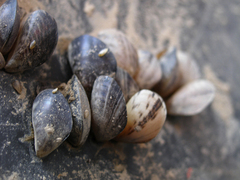forum
library
tutorial
contact

If Invasive Mussels Get Into Columbia,
Salmon are In Trouble
by Matthew PreuschThe Oregonian, August 21, 2009
|
the film forum library tutorial contact |

|
If Invasive Mussels Get Into Columbia,
by Matthew Preusch |
 Northwest wildlife and power officials are increasingly concerned about the impact a tiny traveling mussel could have on the region's multi-billion dollar effort to save Columbia and Snake river salmon.
Northwest wildlife and power officials are increasingly concerned about the impact a tiny traveling mussel could have on the region's multi-billion dollar effort to save Columbia and Snake river salmon.
A recent memo prepared by Jim Ruff of the Northwest Power and Conservation Council clearly explains their fears: the invasive mussels will make it here eventually, and it's going to cost us lots of money when they do.
The mussels in question, called quaggas and zebras, come from Europe and arrived in the Great Lakes as passengers in the bilge of a boat in the 1980's. They reproduce prolifically, clogging pipes, boat engines and all manner of man-made infrastructure.
More recently they've moved into the Colorado River system, playing havoc with the system of dams there.
So far they aren't in the Northwest, but when they do arrive - and officials expect them to within the next five years - they will cling to fish screens, turbine bays and other parts of the big dams on the Columbia and Snake river.
That will likely mean the region will have to spend more money to keep those facilities clean to simultaneously protect endangered salmon and provide the cheap hydroelectric power the region is used to.
It could even push the fish closer to extinction.
"A quagga or zebra mussel presence in Columbia basin would complicate recovery and preservation efforts for aquatic species listed under the ESA (e.g., salmon, steelhead, bull trout, and Kootenai River sturgeon) and may even increase number of listed species in basin," Ruff's memo says.
Last week, Idaho state Rep. Eric Anderson told the council the mussels represent a "raging wildfire on its borders," the Columbia Basin Bulletin reported.
"I want this thing nipped in the bud," Rep. Anderson said. "Nothing is going to save the salmon if this gets in."
A study earlier this year in the journal Bioscience argued that the non-native species that have preceded the mussels in the region's waters, like crappie and bass, are already the greatest threat to salmon.
Related Sites:
100th Meridian Initiative
Zebra Mussel Information System Army Corp of Engineers
learn more on topics covered in the film
see the video
read the script
learn the songs
discussion forum
